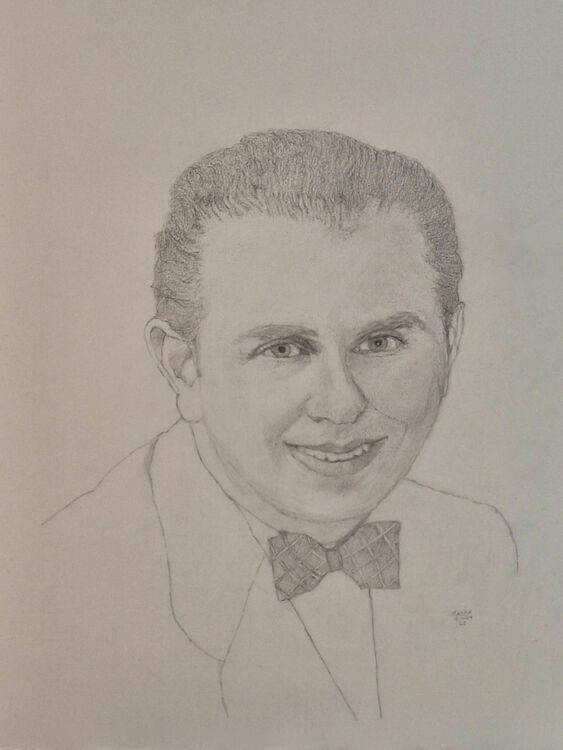
Irving Grossman
Boston-born Irving Grossman descended from an acting family of the Yiddish theatre. His father was a member in a dramatic club, his mother was a Yiddish actress, and an aunt was a chorus singer in the Yiddish theatre.
Irving would learn Yiddish with a teacher, and he finished public and high school in Chicago, where his parents, who had directed a Yiddish itinerant troupe, had settled at the time.
Until age fourteen he acted in children's roles in the local troupe, and in school he took part in the yearly English productions.
His first role as an adult was as "Menasha" in Jacob Gordin's "Jewish Luck," and from then on he has acted in buff comical roles in his father's troupe.
In 1919 he acted for a season in the English theatre with the Belasco Stock Company in San Francisco.
Boris Thomashefsky, who had seen him act in Cleveland, engaged him in 1923 for his Yiddish theatre on Broadway in New York where he performed in the lover roles, and he acted there for twenty-eight weeks. Then he toured with the troupe across the province, acting a season in Boston with Julius Nathanson, two seasons in the National with Louie Goldberg, and during the summer of 1927 and 1928 in English vaudeville on the Fox circuit.
Following a recording contract with Columbia Records and playing the Fox and Orpheum circuits with the likes of Sophie Tucker, Clayton, Jackson and Jimmy Durante, Irving was Molly Picon's leading man in Philadelphia, and then on Second Avenue as well.
His first marriage to actress Goldie Lubritsky ended in divorce after seven years, but it produced a daughter, Gloria. In 1935 he married Yiddish actress Diana Goldberg. The two performed together in Yiddish vaudeville, the cabaret circuits of the Catskills and Miami and headlined on Second Avenue in such shows as "The Queen of Broadway," "Warsaw at Night," "Lucky Fishel" (alongside the inimitable Menasha Skulnik), and countless others.
In the 1950s he and his wife partnered with Irving Jacobson, Mae Schoenfeld, Julius Adler and Henrietta Jacobson at the Second Avenue and National Theatres, producing and starring in numerous musicals written by Rumshinsky and Secunda. Their musical comedy night club act took them all over the world, and they were featured in the reviews, "Bagels and Yox" and "Farfel Follies."
Irving made his film debut in 1949 with "Catskill Honeymoon." Known as an avid "fund raiser," he appeared at many events for the early sale of Israeli Bonds in the 50s, and his renditions of Hymie Jacobson's epic, "Let Me Live" and "Sing, Israel, Sing," helped fill the coffers for the newborn state.
For most of his life Irving was heavily involved in theatrical unions and organizations. Under the mentoring of Reuben Guskin, Irving served as president of the Hebrew Actors' Union from 1952-1954, and he was a board member of the Yiddish Theatrical Alliance for some thirty years, a national board member of The American Guild of Variety Artists, and their delegate to the 4 A's -- the overseeing body of all performing artist unions.